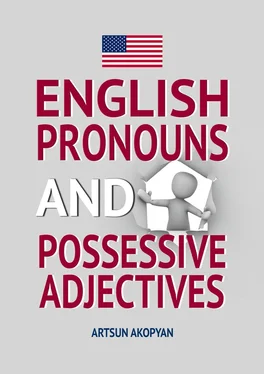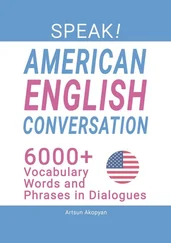English Pronouns and Possessive Adjectives
Artsun Akopyan
© Artsun Akopyan, 2020
ISBN 978-5-0050-6992-4
Created with Ridero smart publishing system
The illustrated tutorial “English Pronouns and Possessive Adjectives”contains all of the pronouns that are used in spoken English, namely personal, demonstrative, possessive, reflexive, indefinite, reciprocal, interrogative, relative pronouns, plus 4 demonstrative adjectives and 7 possessive adjectives.
You will learn how to use pronouns in sentences through examples, illustrations and exercises, rather than theory. This handbook is for beginners and intermediate learnersof English as a second language (ESL) / English as a foreign language (EFL) who want to improve their English grammar and vocabulary.
Artsun Akopyan is a writer and freelance translator based in Russia. He worked at a high school teaching Russian and at a university teaching English. His publications include books for English language learners, short stories and articles, translations of fiction and nonfiction books from English into Russian.
Pronounsare words used instead of nouns and noun phrases.
For example, I, you, he, she, himself, herself, this, that, who, whose, someone, and so on.
List of Pronouns and Possessive Adjectives Used in This Book
Personal subject pronouns: I, you, he, she, it, we, you, they.
Personal object pronouns: me, you, him, her, it, us, you, them.
Demonstrative pronouns and adjectives: this, that, these, those.
Possessive adjectives (determiners): my, your, his, her, its, our, their.
Possessive pronouns: mine, yours, his, hers, its, ours, theirs.
Reflexive pronouns: myself, yourself, himself, herself, itself, ourselves, yourselves, themselves, oneself.
Indefinite pronouns: one, ones, no one, nobody, none, nothing, some, any, somebody, anybody, someone, anyone, something, anything, everybody, everyone, everything, both, each, all, either, neither, another, other, others, many, few, little, much, plenty, several, less, more, most.
Reciprocal pronouns: each other, one another.
Interrogative pronouns: who, whom, whose, which, what, whoever, whichever, whatever.
Relative pronouns: that, who, whom, whose, which, whoever, whatever, whichever.
I, you, he/she/it, we, you, they
The words I, you, he, she, it, we, you, and theyare personal subject pronouns .

Read and translate the examples into your language:
I am a man.
I am a woman.

Youare a boy.
Youare not a man.
Youare a child.
Youare a girl.
Youare not a woman.
Youare a child, too.
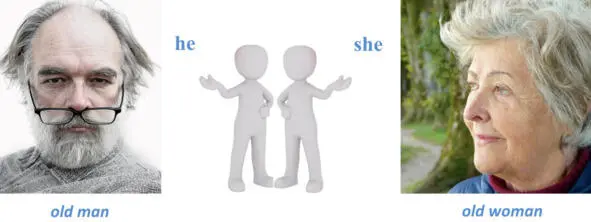
Heis an old man.
Heis not a boy.
Heis not a child.
Sheis an old woman.
Sheis not a girl.
Sheis not a child.
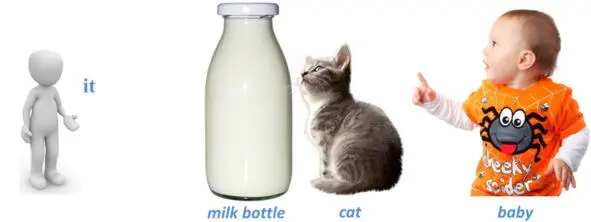
Itis milk.
Itis a bottle.
Itis a milk bottle.
Itis a cat.
Itis a baby.

Weare men.
Weare young men.
Weare not old men.
Weare women.
Weare young women.
Weare not old women.
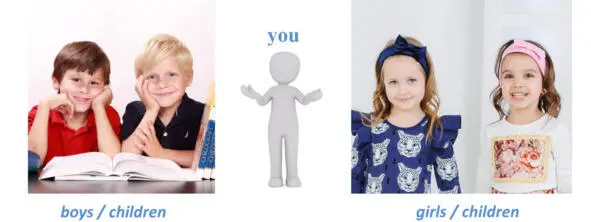
Youare boys.
Youare girls.
Youare boys and girls.
Youare children.
Youare not men and women.

Theyare people.
Theyare young and old.
Theyare young and old people.
Theyare men, women and children.
Complete the sentences.
1. I ____ a man.
2. She ____ a woman.
3. She ____ an old woman.
4. I ____ a woman.
5. It ____ milk.
6. They ______ people.
7. You ______ children.
8. He ____ an old man.
9. ______ are a boy.
10. ____ is a bottle.
11. You ______ girls.
Читать дальше
